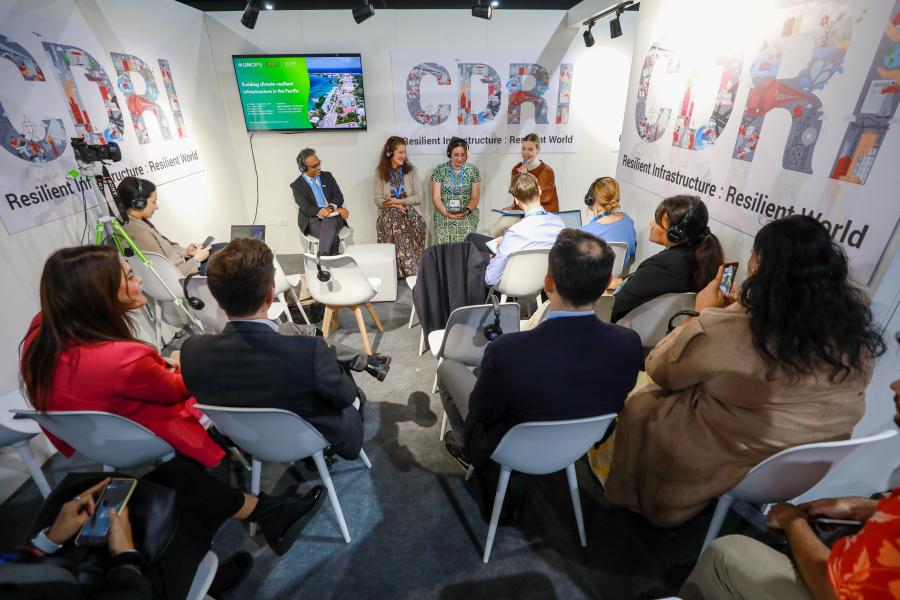Pacific Voice Raised for Climate-Resilient Infrastructure at COP29
17 November 2024
UNOPS successfully hosted a panel discussion, "Building Climate-Resilient Infrastructure in the Pacific", at the Coalition for Disaster Resilient Infrastructure (CDRI) Pavilion during COP29.
17 November, Baku, Azerbaijan - UNOPS successfully hosted a panel discussion, "Building Climate-Resilient Infrastructure in the Pacific", at the Coalition for Disaster Resilient Infrastructure (CDRI) Pavilion during COP29. This session focused on pioneering strategies to address the urgent infrastructure challenges faced by Small Island Developing States (SIDS) in the Pacific.

Pacific SIDS are at the forefront of the global climate crisis, grappling with rising sea levels and increasingly severe weather events that threaten vital infrastructure, economies, and communities. The session highlighted innovative approaches undertaken through a partnership between UNOPS, CDRI, and the Republic of the Marshall Islands to build resilience in health and coastal infrastructure.
Central to the discussion was the “Roadmap for Health and Coastal Infrastructure Resilience” project, which leveraged cross-sector collaboration, inclusive planning, and data-driven insights to mitigate vulnerabilities. The panel explored replicable strategies, best practices, and actionable insights to enhance resilience not only in the Pacific but also in other climate-vulnerable regions.
Moderated by Kajsa Hartman, Head of UNOPS Nairobi Liaison Office (a.i.), the session featured experts, officials, and youth representatives with a shared commitment to climate action.
Ramraj Narasimhan, Senior Director of Program Management & Technical Support, CDRI, shared his insights, that “Pacific SIDS are highly vulnerable to disasters. Through the Infrastructure for Resilient Island States (IRIS) programme, CDRI is collaborating with these nations on knowledge and tools to strengthen the disaster resilience of their critical infrastructure, thereby protecting lives and livelihoods. Such efforts include projects like the National Surveys for Infrastructure Resilience Geospatial Databases, where, together with the Pacific Community, CDRI is partnering with the governments of Vanuatu, Kiribati and Tonga to create an accessible and centralized database of hazards and infrastructure assets to inform effective early warning systems. We remain dedicated to expanding this support to benefit even more SIDS and will announce a second cohort of projects to be funded, including some in the Pacific, at COP29.”
Simonetta Siligato, UNOPS Asia Pacific Senior Advisor, showcased UNOPS contributions to advancing climate-resilient infrastructure in the Pacific. “UNOPS has been actively applying our expertise, working closely with partners like CDRI and local governments in the Pacific. Our joint efforts in the Marshall Islands and Kiribati are great examples of how we’re bringing together cross-sector knowledge, technical expertise, and data-driven approaches to create tangible solutions that can withstand climate threats.”
Luna-Rossa Lomitusi, Youth Representative and Climate Advocate from Samoa, concluded the session with her vision for a resilient Pacific by 2050. “Building resilient infrastructure is not just about strengthening physical structures; it is about safeguarding our communities, preserving our natural environments, and ensuring the continuity of essential services. It provides the foundation for economic stability, food security, and social well-being, all of which are vital for the sustainable development of Pacific nations. Practical capacity-building support is equally critical, equipping Pacific communities with the skills and knowledge needed to effectively maintain and adapt this infrastructure, ensuring its longevity and enhancing local resilience. Together, these efforts lay the groundwork for a brighter, more resilient Pacific by 2050, where our communities thrive in the face of climate challenges.”
The session offered a unique platform to explore how innovative partnerships and strategic investments can drive climate adaptation and infrastructure resilience in some of the world’s most vulnerable regions. An interactive Q&A session further fostered a dynamic exchange of ideas and insights, providing valuable perspectives from the audience.
ENDS
About UNOPS
UNOPS mission is to help people build better lives and countries achieve peace and sustainable development. We help the United Nations, governments and other partners to manage projects, and deliver sustainable infrastructure and procurement in an efficient way. Read more: www.unops.org
About CDRI
The Coalition for Disaster Resilient Infrastructure (CDRI) is a partnership of national governments, UN agencies and programmes, multilateral development banks and financing mechanisms, the private sector, and knowledge institutions that aims to promote the resilience of new and existing infrastructure systems to climate and disaster risks in support of sustainable development. Read more: www.cdri.world




